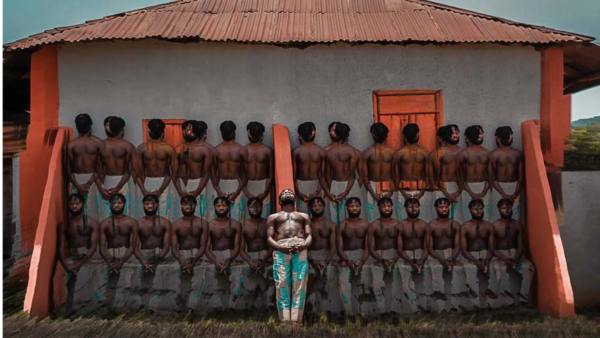

Looking back on the Building Beyond Lab Week in Accra, Ghana
From 5 to 12 May 2023, the twelve cross-disciplinary African makers and designers participating in the Building Beyond mentorship programme met face to face in Accra. After a series of online sessions led by the four programme mentors – Khensani de Klerk, Ola Hassanain, Nzinga Mboup and Hicham Bouzid – it was very special and exciting to meet up as a group in the Ghanaian capital. Accra, a dynamic city that never stops, provided the scene for critical and reflective discussions, exchanges and meetings with the various cultural and creative practices of local organizations and initiatives. Roxanne da Graça, grant officer of the Internationalization programme, looks back on the experience.

20 June 2023
The start of this year also marked the start of the second edition of the mentorship programme Building Beyond, a unique collaboration between the Creative Industries Fund NL and the Prins Claus Fund. Building Beyond seeks to encourage and facilitate open dialogue, collaboration and connection, while also supporting the individual practices of the participants. Furthermore, the programme is intended to promote exchange and interaction between the makers from the African continent and the Netherlands.
The twelve participants work in various countries, including Egypt, Morocco, Libya, Nigeria, Kenya, Benin, Ethiopia, Tanzania, Mozambique and South Africa. Click this link to see the biographies of the mentors and participants.

getting acquainted
The lab week began with introductions, for the mentors, participants and fund staff to become acquainted. The participants and the mentors had each prepared a presentation to introduce their own individual practice and reflecting on the consequences and influence of urbanisation in relation to public space in African cities and the participation of local communities. The content programme was also presented, and time was reserved for everyone to get used to their 'new' environment.
After the introduction session, a presentation was given by Courage Dzidula Kpodo, one of the founders of Postbox Ghana, a collective that focuses on Ghana’s urban areas as well as the history (both colonial and postcolonial) and current dynamics since the country’s independence. Many of the participants’ individual practices had links with urban challenges and topical social themes, for example designing greener, more environmentally conscious public spaces and climate-adaptive places, creating more awareness for the consequences of rapid urbanisation for local communities, and promoting citizen participation in the development of inclusive urban policies. During the week, the participants regularly discussed the efforts and strength required to work within the often complex financial, political, social and ecological contexts.


visiting creative and cultural organizations
Accra is a city of contrasts, with both a colonial history and a growing young generation, engaging with the future with a great deal of energy and courage. During the lab week we were received by passionate and committed organizations and people in the cultural and creative fields. In a variety of sessions, the group was able to see developments, communities and dynamics in the city from various perspectives, and to reflect on what they saw. For example, architect Ruth-Anne Richardson of StudioRED took the group on a tour of the Makola Market, a historically significant place whose size and location make it particularly special. During the tour, the group was asked to note and reflect on aspects that felt familiar and aspects that did not, and to see what stood out about the architecture, rhythms and interactions with the merchants on the market, most of whom are women.

alternative and sustainable architecture
Space maker and activist Namata Serumaga-Musisi, founder of The Griot Introspect, organised a working session about decoloniality and the use of urban areas. The main topic was the hierarchical tension between spaces such as markets and shopping centres, and between modern African hybrids such as banks and kiosks. She also discussed the relation between the post-colonial era planned city and how the city is used and experienced by its residents. Latifah Idriss, founder of Cult Meraki, also deals with these themes in her practice. Cult Meraki organised a session about their work, which is primarily inspired by so-called kiosk architecture. The group subsequently travelled to Mampong Akuapem on the city’s outskirts to visit ArtHAUS, a creative space for Ghanaian and African makers and artists under the guidance of founder and artist Kofi Setordji. The space is a showcase inspired by alternative and sustainable architecture.

In addition to the working sessions focusing on practices in cultural design and/or architecture, the week was filled with visits to established organizations and institutions in Accra’s cultural creative scene such as the Nubuke Foundation, The African Futures Institute and the Foundation for Contemporary Art-Ghana (FCA), which is a platform for the critical presentation, development and promotion of contemporary art in Ghana. Here again, the group engaged in discussions and reflections on urban dynamics in Ghana and on the African continent.

looking forward
In the coming months, the twelve participants and four mentors will continue to collaborate on their projects online. They will convene again during another lab week in the Netherlands this autumn, where they will meet makers, designers, cultural platforms and institutions, just as they did in Accra. We look forward to welcoming them and facilitating another wonderful programme that allows everyone to learn from each other, inspire each other and explore potential new collaborations.






